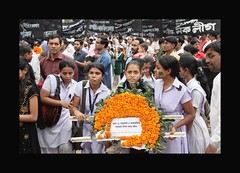NO Self promotion by Image / HTML or WEB Link
NO Faves With out Comments plz,
Doing such act might cause you A Block from Me
Only Appreciation. Critics . comments Faves, Notes , Blog it And Own Comments are welcome and NO Round Up Comments plz !!
Take Some time with me to share your feelings here,
____________________________________________ ,
,
,Pay Visit to my:
Light Box
Getty Image Here
Twitter Here
Face Book Here
My Blog Here
My Modern Met Here
Red Bubble Here
___________________________________________________________
.
The Edit of this Photo Demands Your View In BLACK with Large size for better out put, Plz Press L for Black
_________________
Description
The Bengali Language Movement, also known as the Language Movement (Bengali: ভাষা আন্দোলন; Bhasha Andolon), was a political effort in Bangladesh (then known as East Pakistan), advocating the recognition of the Bengali language as an official language ofPakistan. Such recognition would allow Bengali to be used in government affairs.When the state of Pakistan was formed in 1947, its two regions, East Pakistan (also called East Bengal) and West Pakistan, were split along cultural, geographical, and linguistic lines. In 1948, the Government of Pakistan ordained Urdu as the sole national language, sparking extensive protests among the Bengali-speaking majority of East Pakistan. Facing rising sectarian tensions and mass discontent with the new law, the government outlawed public meetings and rallies. The students of the University of Dhaka and other political activists defied the law and organised a protest on 21 February 1952. The movement reached its climax when police killed student demonstrators on that day. The deaths provoked widespread civil unrest led by the Awami Muslim League, later renamed the Awami League. After years of conflict, the central government relented and granted official status to the Bengali language in 1956. In 2000,UNESCO declared 21 February International Mother Language Day for the whole world to celebrate[1], in tribute to the Language Movement and the ethno-linguistic rights of people around the world.The Language Movement catalysed the assertion of Bengali national identity in Pakistan, and became a forerunner to Bengali nationalist movements, including the 6-point movement and subsequently the Bangladesh Liberation War in 1971. In Bangladesh, 21 February is observed as Language Movement Day, a national holiday. The Shaheed Minar monument was constructed near Dhaka Medical College in memory of the movement and its victims
Background
The present nations of Pakistan and Bangladesh were part of undivided India during the British colonial rule. From the mid-19th century, the Urdu language had been promoted as thelingua franca of Indian Muslims by political and religious leaders such as Sir Khwaja Salimullah, Sir Syed Ahmed Khan, Nawab Viqar-ul-Mulk and Maulvi Abdul Haq.[2][3] Urdu is an Indo-Aryan language of the Indo-Iranian branch, belonging to the Indo-European family of languages. It developed under Persian, Arabic and Turkic influence on apabhramshas (last linguistic stage of the medieval Indian Aryan language Pali-Prakrit)[4] in South Asia during the Delhi Sultanate and Mughal Empire.[5] With its Perso-Arabic script, the language was considered a vital element of the Islamic culture for Indian Muslims; Hindi and the Devanagari script were seen as fundamentals of Hindu culture.[2]While the use of Urdu grew common with Muslims in northern India, the Muslims of Bengal (a province in the eastern part of British Indian sub-continent) primarily used the Bengali language. Bengali is an Eastern Indo-Aryan language that arose from the eastern Middle Indic languages around 1000 CE[6] and developed considerably during the Bengal Renaissance. As early as the late 19th century, social activists such as the Muslim feminist Roquia Sakhawat Hussain were choosing to write in Bengali to reach out to the people and develop it as a modern literary language. Supporters of Bengali opposed Urdu even before the partition of India, when delegates from Bengal rejected the idea of making Urdu the lingua franca of Muslim India in the 1937 Lucknow session of the Muslim League. The Muslim League was a British Indian political party that became the driving force behind the creation of Pakistan as a Muslim state separate from British India.[7]
The Other Set related to this set are available here at : International Mother Language Day
All other Phots os this set are available at : National Language Movement Day 2011
_____________________________________
Thanks In Advance for not Inviting me to any Group and Attaching Graphics to this picture as a part of your comments, I appreciate you to view my photo , click Faves and write your comments instead you copy pest your comment to me.
Press F to Faves This Photo

No comments:
Post a Comment